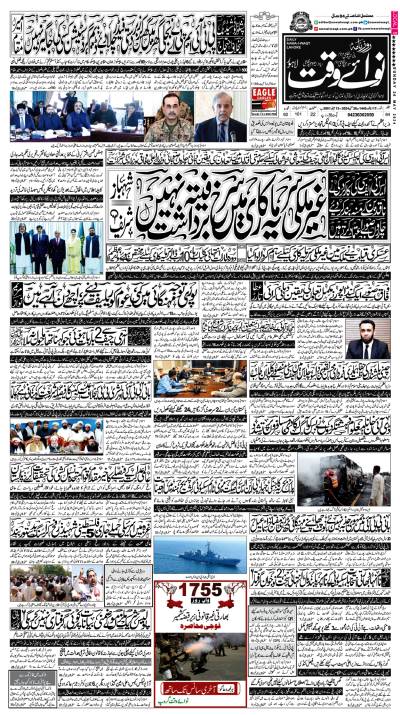islamabad
Finance Minister Senator Ishaq Dar on Tuesday said that an economically strong, democratic Pakistan would not only defeat extremism at home but would contribute immensely to the stability of the region.
He further said that Pakistan will also be an engine of growth for the regional economies with its strategic location to sea and contiguity to vast land mass of South Asia that connects efficiently to the Eurasian land mass as well, he said.
Addressing the International Seminar: “Crossroads Asia: Dynamics of Peace and Progress” organised by the National Defence University, Pakistan has undergone a remarkable economic recovery over a short period of time, which is widely acknowledged by independent analysts, particularly international financial institutions. Even though the Government of Prime Minister Nawaz Sharif inherited a broken economy, it was not deterred by the challenges it faced. The Government ever since assuming responsibilities embarked upon a process of deep-rooted economic reforms, such as tax measures and adjustment in administered prices, without which meaningful hope for economic revival was not possible, he added.
The Minister said the government desired to achieve growth of around 7pc as it was necessary to address poverty incidence and unemployment while improving socio-economic indicators, including health and education. “We are also working to improve the energy mix to avoid the need for tariff increases and to attract foreign direct investment”, the Minister added.
Giving a brief account of future roadmap he said we foresee GDP to grow gradually to around 7pc; inflation to remain in single digits i.e less than 8pc; fiscal deficit to be brought down to 4pc; foreign exchange reserves growing to $20 billion; investment-to-GDP ratio brought to 22pc and similarly view at industrial sector to grow by 8pc. The Minister also envisaged spending around 4pc of GDP on education and health, with key social indicators equal or better than regional countries.
Ishaq Dar said Pakistan was actively promoting a number of projects that would enhance regional connectivity and joint exploitation of regional resources. CASA-1000 project costing nearly $1 billion will originate in Kyrgyz Republic and pass through Tajikistan and Afghanistan and terminate in Pakistan, providing us 1000 MW of energy. The Turkmenistan-Afghanistan-Pakistan-India (TAPI) gas pipeline project, he said would supply natural gas from Turkmenistan to Afghanistan, Pakistan and India. Thirdly, he mentioned Central Asia Regional Economic Cooperation (CAREC) a partnership of 10 countries including Afghanistan, Azerbaijan, Kazakhstan, Kyrgyz Republic, Mongolia, Pakistan, China, Tajikistan, Turkmenistan and Uzbekistan. CAREC Ministers, he said have recently approved a $23 billion Action Plan for undertaking regional connectivity projects in the priority areas in member countries, the Minister said.
The Minister remarked that today, we have a broader quest for peace and progress at ‘Crossroad Asia’ that comes into sharper focus as the global environs experience an erosion of uni-polar order and ‘Rise of the Rest’ viz-a-viz the West. The upcoming phase 2015-25, he said should be revealing in terms of system-wide changes and their trans-regional impact. This phenomenon is critically important for Pakistan in view of its geopolitical disposition at the intersection of three regions: South Asia, Central Asia and West Asia. Ishaq Dar in his address emphasised the resolution of Kashmir in line with the aspirations of the Kashmiri people. A resolution of Kashmir dispute in keeping with the people’s right to self-determination is directly related to any significant progress in India-Pakistan normalisation process, Dar observed. He also expressed Pakistan’s desire for realisation of peace in Afghanistan. Similarly, he said resolution of Palestine issue was important for peace in the Middle East.
Sunday, May 26, 2024
Minister says govt aiming to achieve 7pc growth rate

Petrol prices likely to drop further from June 1
9:55 PM | May 26, 2024
Mercury soars to 50 Celsius in five districts of Sindh and Punjab
3:41 PM | May 26, 2024
PTI leader Dr. Yasmin Rashid discharged from hospital
3:31 PM | May 26, 2024
Pakistan Sports Festival concluded
2:01 PM | May 26, 2024
PM reaffirms Pakistan's commitment to 'One China' policy
1:14 PM | May 26, 2024
Taiwan Escalation
May 26, 2024
Salaries & Pensions
May 26, 2024
Controlling Mobs
May 26, 2024
An Effective Registry
May 25, 2024
Economic Respite
May 25, 2024
History’s Biggest Fraud
May 26, 2024
Self-Medication
May 26, 2024
A Call for Reform
May 26, 2024
Natural Resources in Balochistan
May 25, 2024
Tribal Disputes
May 25, 2024
ePaper - Nawaiwaqt
Advertisement
Nawaiwaqt Group | Copyright © 2024





